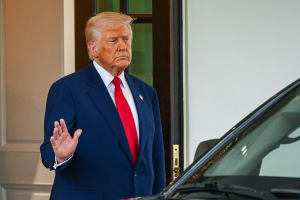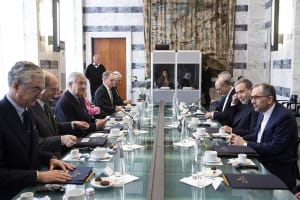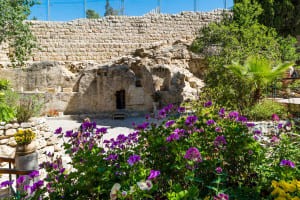Israeli officials reportedly concerned Trump may be repeating Obama-era nuclear deal mistakes
Mossad chief Barnea and Netanyahu advisor Dermer attempt to clearly convey Israel’s concerns to US envoy Witkoff

Following a report last week that U.S. President Donald Trump prevented an Israeli strike on Iranian nuclear sites – as well as Iran’s apparent satisfaction with the current nuclear talks – some Israeli defense officials are concerned that U.S. Middle East envoy Steve Witkoff has not given sufficient weight to Israel’s concerns over Iran’s nuclear weapons program.
On Friday, Mossad Director David Barnea and Strategic Affairs Minister Ron Dermer met with Witkoff in Paris, ahead of the second round of talks in Rome on Saturday. Both officials are considered to be well-respected by their U.S. counterparts and are familiar with the Trump administration.
The Jerusalem Post reported that the officials expressed the Israeli concern that Trump would make an agreement with Iran that is substantially similar to the Joint Comprehensive Plan of Action (JCPOA) negotiated by former President Barrack Obama in 2015, which would not significantly impede the Islamic Republic’s ability to produce nuclear weapons.
According to a report in Axios, Witkoff told the two officials that President Trump wanted to resolve the situation through diplomatic means, but is committed to ensuring Iran does not develop a nuclear weapon.
Following Iran’s positive reaction to talks on Saturday, the lack of clear details regarding the negotiations from the U.S., and the scheduling of a third round of talks, Israeli officials fear another bad deal.
Witkoff has issued contradictory statements about U.S. demands in the negotiations, while Iran has indicated a willingness to return only to the terms outlined in the original JCPOA.
Trump said he decided to first pursue diplomatic efforts to defuse the Iranian nuclear threat, while not ruling out a potential military strike later on. Israeli Prime Minister Benjamin Netanyahu's recent trip to the White House to speak with Trump led many to believe that a military strike on Iranian nuclear facilities could be on the horizon. However, rather than declaring U.S. support for such a plan, Trump announced direct talks with Iran—a move that appeared to catch even Netanyahu by surprise.
Trump later told media representatives that he is currently prioritizing a diplomatic solution over a military strike.
“I’m not in a rush to do it,” Trump said in recent remarks to the press.
“Iran has a chance to have a great country, and to live happily without death, and I’d like to see that. That’s my first option,” he said, before adding, “If there’s a second option, I think that would be very bad for Iran.”
However, the president has made it clear that he would approve military action against the Islamic Republic if diplomatic efforts fail.
Israeli defense officials have assessed that a current window of opportunity exists to strike Iran’s nuclear program, citing the ayatollah regime’s vulnerability amid escalating socio-economic turmoil and rising anti-regime sentiment within Iranian society. This is especially evident following the October 2024 Israeli retaliatory strikes that took out most of Iran’s air defense systems, leaving its military and nuclear facilities open to a potential attack.
Iranian Foreign Minister Abbas Araghchi recently commented that a deal between the two countries could be reached if the United States doesn't present “unrealistic demands.” According to Araghchi, one such “unrealistic demand” is that Iran completely halt uranium enrichment.
“If they demonstrate seriousness of intent and do not make unrealistic demands, reaching agreements is possible,” Araghchi said last week during a news conference in Moscow.
Iran currently has large stores of uranium enriched to more than 60% purity, far beyond what is needed for any civilian nuclear program, such as electricity generation or medical diagnostics and treatment. This stockpile would enable Iran to “sprint” toward the weapons-grade enrichment level – approximately 85% purity or higher – required to produce a nuclear weapon.
Despite these concerns, an Israeli source with ties to the White House recently told Israel Hayom that Trump understands the threat posed by a nuclear-armed Iran and remains committed to preventing it.
The source indicated that the U.S. intends to allow Iran to grasp the seriousness of the negotiations, asserting that Washington will escalate its demand, potentially prompting the Islamic Republic to walk away from the talks.

The All Israel News Staff is a team of journalists in Israel.
You might also like to read this:


















